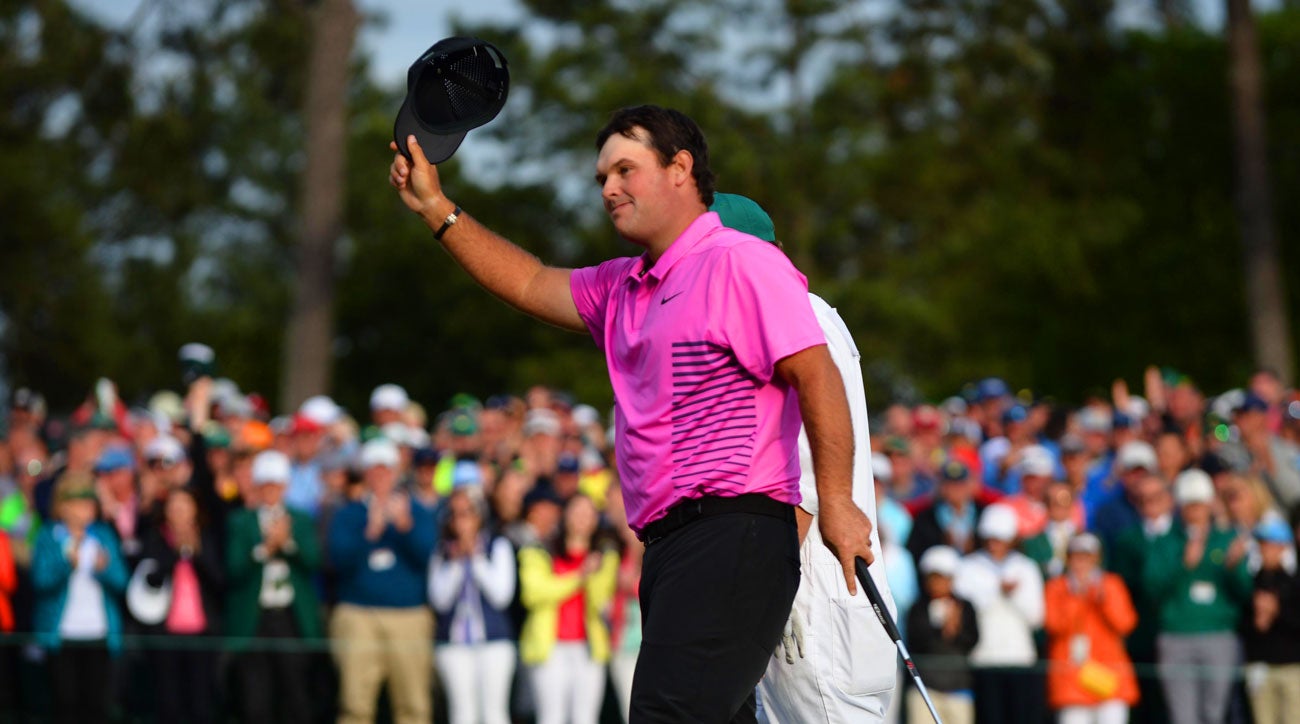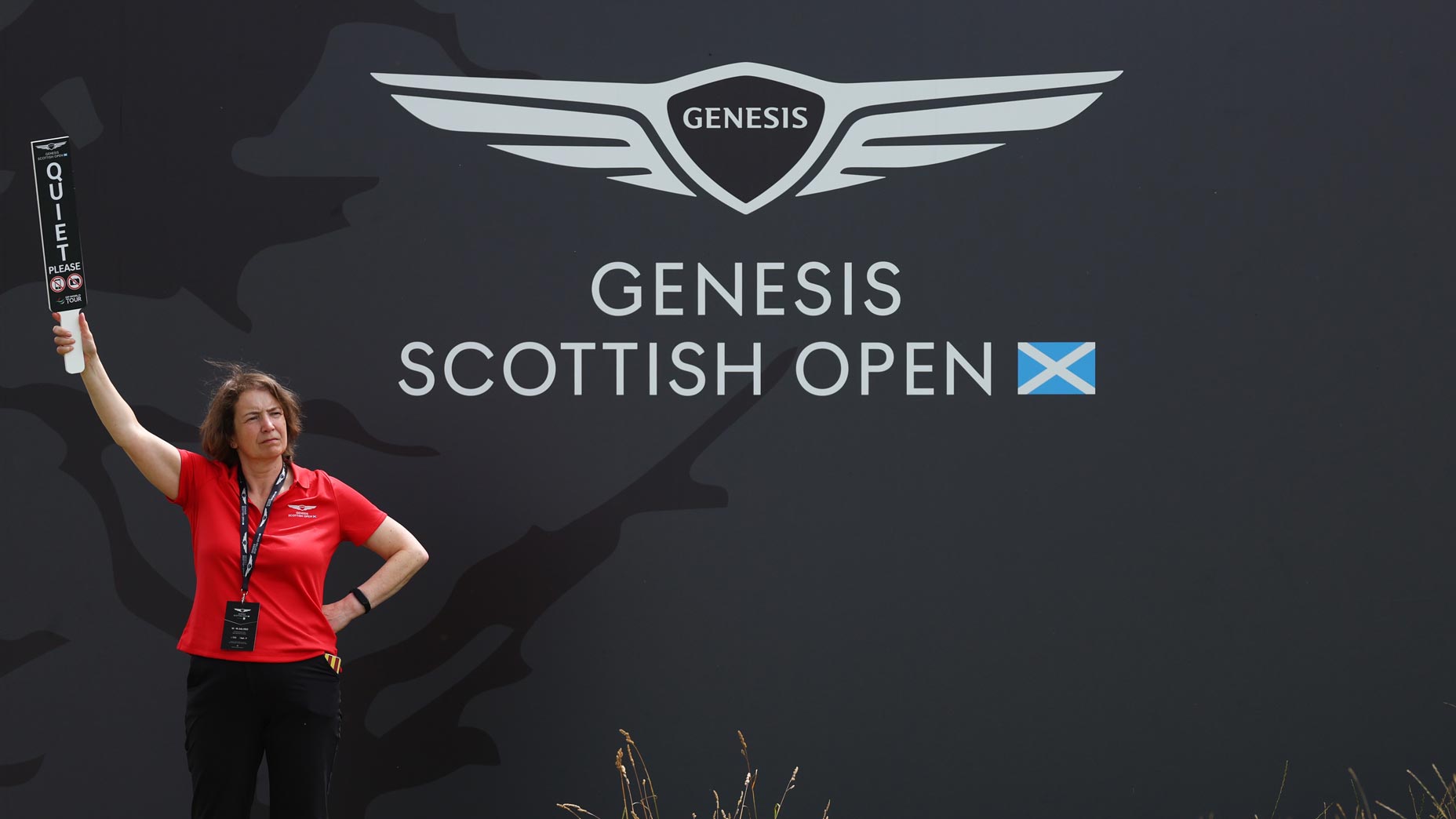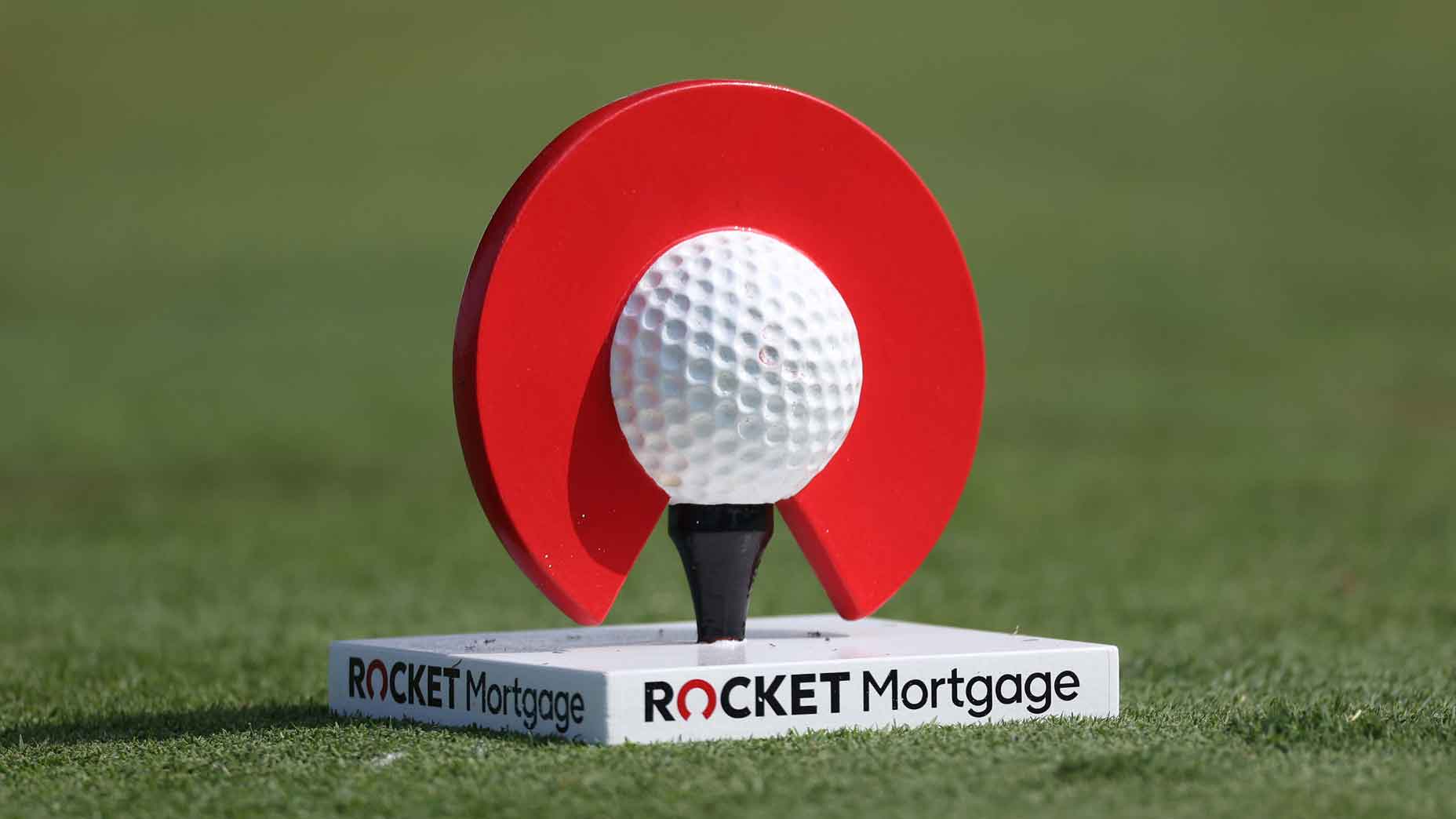AUGUSTA, Ga. — You play to the house. It’s been that way forever. You get to the clubhouse with a scorecard and a score and if you’re the guy — if you’re the leader in the house — time stops and you look around, to see if there’s a pocket of oxygen in the room — somewhere, anywhere. You’re dying but you’ve never felt more alive.
First, it was Jordan Spieth in that odd and delicious spot. Then Rickie Fowler pushed him out. By posting 14 under, he told Patrick Reed exactly what he needed to do. And Reed did.
Reed finished par, par, par, par, par, but this was not a U.S. Open. Reed knew he could not make a mistake and he didn’t make a mistake and for that he deserves, and will get, all the golfing credit this game can give him. But Fowler, with a closing 67, and Spieth, who shot a Sunday 64, made this Masters a Masters that you’ll be YouTubing for a long time to come. It may not be Bob Goalby-Roberto Di Vicenzo (1968 and available for your YouTube viewing pleasure) but it was excellent in every way.
Spieth and Fowler provided the day’s fireworks and a Sunday at the Masters without fireworks is just … eh. Reed was the 54-hole leader by three, so his job was to get the work done, and to do it he worked like a dog. His win was thrilling because of the pressure the other blokes dropped on him. But his closing 71, one under, got him the makeover he needed. Pink shirt (instead of his usual red). Matching pink cheeks. Black pants, as per usual. Green coat.

Mother nature gets an assist. When Fred Couples won the Masters in 1992 he hit a tee shot on the par-3 12th that stayed on the bank when, by the laws of gravity and logic, it should have died in Rae’s Creek. Reed had a Fred moment of his own, but his came on the next hole, on his second shot on the par-5 13th. It stayed on the bank — just sat there like an obedient dog and likely saved him a shot. Thank you, overnight rain.
Why is it that Fred Couples is Fred but Patrick Reed is Reed? Why do we — reporters, fans, TV commentators and broadcasters — not embrace this guy more? He’s honest. He’s straightforward. He plays hard and to win. But he’s not one of the boys. He married young, his brother-in-law is his caddie and he leads an insular Tour life, except for Presidents Cup and Ryder Cup weeks, when he embraces team play in all its red, white and blueness. His yardage book is covered with stars and stripes and he was famous long before this 2018 Masters for being about the only bright light in the dismal 2014 Ryder Cup in Scotland. At the 2016 event, he played like a WWE wrestler.
If you’re into this whole America First thing, this was the tournament for you. Last year, a Spaniard and Englishman played off. This year’s tournament brought to mind the 1979 event, when three Americans – Ed Sneed, Tom Watson and the eventual winner, Fuzzy Zoeller — duked it out, the day decided in playoff. They are a threesome to this day and even though Reed and Spieth and Fowler played in three different groups they will be a threesome in our memory banks, too.
They have all three played on the last two Ryder Cup teams and Reed and Spieth, both Texans, have been Ryder Cup playing partners. Those two will now have a standing dinner date — Tuesday night of Masters week at the Champions Dinner — for the rest of their life. Maybe Fowler will join them someday. He now has finished fifth or better in seven majors. He’s a talented golfer but winning is hard — Patrick Reed is here to tell you that — and winning majors harder yet. Tom Weiskopf won one. (British, ‘73.) Davis Love, one. (PGA, ‘97.) Fred Couples, one. (Augusta, ’92.) Tom Kite, one. (U.S. Open, ’92.) Fowler’s search continues. The U.S. Open at Shinnecock Hills begins June 14.
Reed is a talent, a cheeky golfer and talker. He may not be loved by his fellow touring pros but he plays from the heart and don’t let the baby fat fool you. Dude’s strong as an ox, even though he doesn’t kill it, not by any means. When he and Dustin Johnson play side-by-side, Reed will lag 30 or 40 yards behind him. Not that they’re playing together all that much, and never on Tuesdays. Reed plays a lot of his practice rounds alone. He’s not trying to win a popularity contest. He’s trying to win valuable prizes and a pile of cash. His winner’s share — are we allowed to discuss the money? — is a roll short of $2 million. Not bad for a guy who was writing $250 checks to enter Monday four-spot qualifiers as recently as 2012. To anyone who knows anything about hard it is to make it on the PGA Tour — Tiger Woods, Vijay Singh, Tommy “Two Gloves” Gainey — Patrick Reed is the poster boy for what it’s all about. When he won at Doral in 2014 — that when he said he felt in his mind that he was a top-5 player in the world — he could not hit a fade to save his life. At the Masters, he played fade tee shots all day long with a hold finish that brought to mind Arnold Palmer, Jim Thorpe and other meat-armed players with the strength to stop the club from turning over.
This is weird and it remains weird: nobody has ever shot four straight rounds of 69 or better in the Masters. Not Tiger. Not Big Jack. Not Reed, who went 69, 66, 67 and 71. When Reed holed his four-footer for par — his four-footer to win — he made the thrilling walk to the scorer’s room at Augusta National, in the club’s old white clubhouse, near the pro shop and below the members’ locker room, with drapes on the door that prevent you from seeing the sacred activity. Fifty years ago, when Di Vincenzo signed his famously incorrect card, the club had a table beyond the 18th green. Reed entered the sanctum sanctorum with a wicked grin and Fowler’s handprint on his back. Say what you will about this Rickie Fowler, he’s the epitome of the graceful loser.

At 6 p.m., Spieth was behind those curtains, the leader in the house, and Reed had him by two. Reed had been the 54-hole leader, by three shots over Rory McIlroy and nine over Spieth. Reed, playing with Rory, was four groups, three holes and 40 minutes behind Spieth. The witching hour was upon us. Many of us — we’re guessing you — wait all this year for this delicious moment. It doesn’t always come. This year it did, in spades.
Fowler was right in front of Reed. In fact, Reed was walking to the 18th tee when Fowler made a birdie three on the last that was (nod to another Texan) dead solid perfect. Smashed drive. Smashed iron to about six feet. Putt that was nothing but San Antonio net. If you can make a three like that at the end, you can win a major. Fowler can talk all day long about how “we” did this and “we” did that. Listen, kid: you stood there and made what looked then like a three for the ages. Nod to the people and call it your own.
With his thrilling and closing birdie for 67 and 14 under, the day for a moment was his. He needed Reed to pull a Norman. In his exterior life, Fowler is as collected and quiet as Reed and Spieth are emotional and talky. Still, he had to be going crazy. He has to know what we all know, that there’s a gap between his fame and his accomplishments. He’ll turn 30 in December. Hogan never won a major in his 20s. He has time. But he’s actually an old 29.
Spieth’s old for his age, too, but in a totally different way. You will never meet a wiser and more balanced 24-year-old in your life. The hybrid he hit off the pine needles for his second shot on 13, looking to carry the creek, looking to make an eagle, looking to win his second Masters, is already ageless, and his commentary was classic.
“Go,” said Spieth, loud enough for his ball to hear him. “Go. Go! GO!”
Odd to say, but it was the shot of the tournament, even if it led to nothing more than being the leader in the house. The ball was in the air for either an eternity or a nanosecond, it’s hard to say which. It carried the creek by a yard or two, popped on up and came to a halt 12 feet from the hole. He had to make it. He did not.
So we have Fowler’s 3 on the last and Spieth’s 4 on 13 — what was Reed’s shot of the day? He had a bunch of superb putts and drives and chips and his 22-footer for birdie on 12 was great, great, great. But his tugged tee shot with a driver on the first was maybe the shot of the day, in an odd way. You spend your golfing life trying to get into the last group of a major. You wait all day for a 2:40 p.m. tee time. Your playing partner, the globe-trotting Mr. McIlroy, is one of the most glamorous and talented players in the world, and he’s trying to complete the career grand slam. The first hole is perfect for you and sets up supremely well for your everyday baby-draw drive. And you wind up on the straw. You could go anywhere from there, and from an opening bogey, and many have, often south.
The golfing scientists have made the shepherds’ game seem so complicated it is easy to forget that it tests the head as much as anything else. Yes, the angle of your right foot at the conclusion of the swing is absolutely critical. But if you want to win a Masters, you also have to be in control of your emotions, your nerves — your desire. Curiosity killed the cat but desire has killed more major aspirants than the yips and the shanks combined. Tiger Woods didn’t win 14 majors in 11 years because of desire. Desire fueled his practice. Execution got him the Ws. Reed followed that bogey with a gutty par on two and a birdie on three. He had righted his ship. That takes — apologies to H.W. Wind but this is the best word for it — balls.

The last group, the last group, the last group. Patrick Reed went to bed knowing, of course, that he was in the last group, that the tournament was his to win. Coming into this crazily anticipated 2018 Masters, 22 of the last 27 winners have come out of the day’s final twosome. The winner is supposed to come out of the last group. That only adds to the strain. Patrick Reed stood up to the strain. He stood up to McIlroy’s par-birdie start, even though that cut the lead to one. He stood up to his complicated family dynamics, hard to summarize except to say that Reed doesn’t talk to his parents, who live on the outskirts of Augusta, even though they would like to talk to him. He stood up to Spieth’s score in the clubhouse and Fowler’s score in the clubhouse. He was the last man standing. He’ll stand at a table next year — Tuesday, April 9 — and toast Spieth and Ben Crenshaw and Tiger Woods and all the other Masters champions who will be joining him for dinner. He’s half an outsider, but now he’s in the club. The whole world wants in. Patrick Reed is in.
“I saw Jordan and Rickie just storm up those leaderboards,” Reed said in his winner’s press conference. “I knew it was going to be a dogfight. It’s just a way of God basically saying, ‘Let’s see if you have it. Everyone knows you have it physically, with the talent. But do you have it mentally? Can you handle the ups and downs throughout the round?'”
That really gets right to the heart of it. Can you handle the ups and downs? That’s golf and that’s life. That’s what makes Sunday at Augusta so revealing and interesting. Patrick Reed did. Jordan Spieth and Rickie Fowler did, too. In the end it was a three-man tournament, with one man riding off in new shiny green sport coat.
Michael Bamberger may be reached at mbamberger0224@aol.com.







